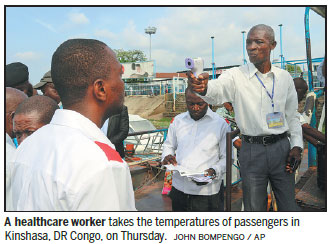More awareness urged to stem Ebola spread in DR Congo
KINSHASA, DR Congo - More awareness is being urged among the population of the Democratic Republic of Congo amid the rising number of suspected and confirmed cases of Ebola in the northwestern part of the country.
The number of cases of the hemorrhagic fever in the country reached 54 by May 24, including 35 confirmed cases.
"We have lost many of our family members so far in Bikoro and other villages," said Michel Bokungua, a resident of Mbandaka.
Many of the victims died before the arrival of doctors, Bokungu said.
Efforts to contain the spread of the deadly virus have been hampered by poor road conditions and the lack of other logistical means.
The noncooperation of some members of the community with the medical professionals also helped propagate the virus, observers said.
On May 23, three patients were whisked from an isolation site to return to their families. Two were found dead later.
"We need to tell more to people to understand how the Ebola virus is contagious," Minister of Health Oly Ilunga said.
Many experts and health observers said the local and international response to the outbreak in the northwestern DRC has been swift.
The World Health Organization has shipped more than 4,000 doses of vaccine to stop the spread of the virus, in collaboration with international partners, including Doctors Without Borders, which has set up treatment facilities.
Serge Moka, a doctor at a hospital in Kinshasa, the capital city, has expressed concern over the reported presence of the Ebola virus in the town of Mbandaka, fearing it could trigger a new, perhaps uncontrollable, phase of the epidemic.
"We need more programs and case studies of people who have died from the epidemic so that people can understand the seriousness of the epidemic that is already in a city like Mbandaka," said Mark Bolakofo, a Mbandaka resident, from Bikoro village, 130 kilometers south of Mbandaka.
On the ground in the affected areas, in Equateur province, mistrust and misinformation are the biggest risks for the spread of the epidemic, observers said.
They cite such factors as the way care is given to the sick; religion; superstition; and funerary rites that help spread the virus.
People are hoping the upcoming vaccination drive will help ease the spread of the virus.
Vaccination is expected to start in Bikoro on Monday, targeting people who have been in contact with confirmed Ebola cases and contacts of these contacts.
For now, medical teams are continuing their field work, reminding the public that vaccination is effective only if other hygiene measures, monitoring, and follow-up procedures are taken properly.
Xinhua

(China Daily 05/29/2018 page12)














